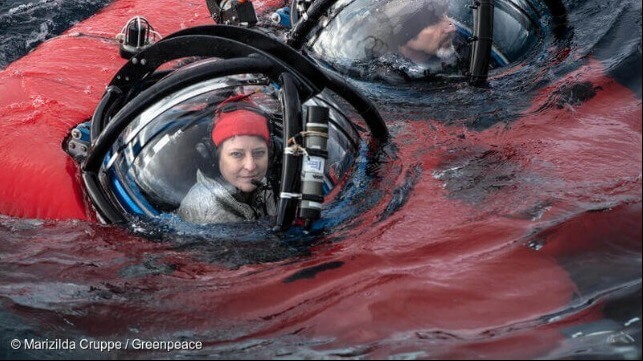Antarctic Ocean Commission Recognizes Vulnerable Marine Ecosystems

[By: Greenpeace USA]
Washington, DC (November 7, 2022) – The Antarctic Ocean Commission (CCAMLR) has again failed to create long promised ocean sanctuaries at their annual meeting. The Commission did however recognize eight new Vulnerable Marine Ecosystems (VMEs), unique Antarctic seabed ecosystems with high biological diversity, which are now protected from fishing. The new VMEs include seven that were documented during submarine dives from the Greenpeace ship, Arctic Sunrise, and cover approximately 27 sq. m. in total [1].
These sites are spectacularly diverse in sponges and corals, which provide living space for other species such as icefish and octopuses. Photo and video from these VMEs on the Antarctic seabed is available here.
John Hocevar, Greenpeace USA’s Director of Oceans who piloted the submarines that conducted the study, said: “In my 15 years of piloting research submarines for Greenpeace and surveying seafloor habitats from the Arctic to the Antarctic, every place we have explored has been full of surprises and new discoveries. On this expedition, I was stunned to see how spectacular the marine life is in those dark frigid waters. There were giant sponges, spider crabs bigger than dinner plates, brightly colored corals, and enough relatives of starfish to fill a stadium. We sat with sleepy octopuses and watched bioluminescent squid flash like flying saucers. I saw hundreds of crocodile ice fish, which have antifreeze in their blood to enable them to survive. There were steep walls and deep canyons, often with nearly one hundred percent of the surface covered with life. Every animal we saw was unique to Antarctic waters.
Hocevar continued: “Our oceans are astonishing in their diversity. We have to start treating them as worthy of protection. Today, every part of the ocean is open to fishing until scientists and environmentalists convince policy makers it is special enough to be protected. We have to take a more precautionary approach. Sanctuaries are the best tool we have to protect marine biodiversity and rebuild depleted populations. We need a strong Global Ocean Treaty, or there will be no chance for governments to meet their commitments to protect 30% of the ocean by 2030. There is no time to waste.”
The Antarctic Ocean Commission failed to reach consensus on creating three large Marine Protected Areas for the Antarctic Peninsula, East Antarctica, and the Weddell Sea, despite support from an overwhelming majority of governments. Two members’ blatant disregard for undisputed scientific advice also left the world’s largest known fish breeding colony, with an estimated 60 million icefish nests, without protection.
Dr. Susanne Lockhart, the lead scientist on the Greenpeace expedition, said: “It is truly disturbing that the Commission has failed to protect an obviously Vulnerable Marine Ecosystem, disregarding unanimous advice put forward by CCAMLR scientists over three scientific assessment meetings. Despite this, the protection of all seven proposed Greenpeace sites, plus one additional site, gives me some hope. Eight sites that support extensive and mature communities now enjoy permanent protection from all bottom fishing activities.”
Dr. Laura Meller of Greenpeace’s Protect the Oceans campaign [2] said:
“I’m glad we’ve fast tracked protection for these Vulnerable Marine Ecosystems, small universes unlike anywhere else on the planet. However once again, the Antarctic Ocean Commission has failed to act at the scale needed to match the climate and ocean crises. Billions of people rely on healthy oceans, they play a vital role in the fight against climate breakdown, but the Commission is letting widely supported proposals which would protect 4 million square kilometers of ocean gather dust on their desks.
Meller continued: “What we’ve seen at the latest Antarctic Ocean Commission meeting provides an example of how not to set up a functioning international body. Its reliance on consensus decision making has left it utterly ineffective, and unable to deliver the protection the Antarctic needs. This dysfunction makes it even more clear that governments must agree on a strong Global Ocean Treaty, with the power to create ocean sanctuaries all over this blue planet, and without letting one or two delegations stop urgent ocean protection.”
The products and services herein described in this press release are not endorsed by The Maritime Executive.

